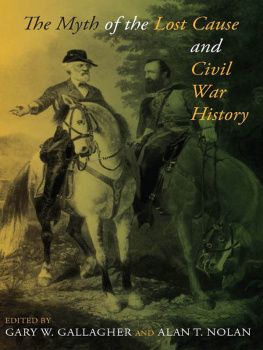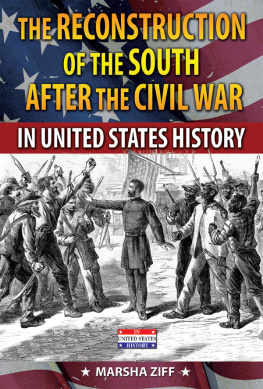SISTER STATES ENEMY STATES
SISTER STATES ENEMY STATES

The Civil War in Kentucky and Tennessee
Edited by Kent T. Dollar, Larry H. Whiteaker, and W. Calvin Dickinson

Copyright 2009 by The University Press of Kentucky
Paperback edition 2011
Scholarly publisher for the Commonwealth,
serving Bellarmine University, Berea College, Centre
College of Kentucky, Eastern Kentucky University,
The Filson Historical Society, Georgetown College,
Kentucky Historical Society, Kentucky State University,
Morehead State University, Murray State University,
Northern Kentucky University, Transylvania University,
University of Kentucky, University of Louisville,
and Western Kentucky University.
All rights reserved.
Editorial and Sales Offices: The University Press of Kentucky
663 South Limestone Street, Lexington, Kentucky 40508-4008
www.kentuckypress.com
Library of Congress Cataloging-in-Publication Data
Sister states, enemy states : the Civil War in Kentucky and Tennessee / edited by Kent Dollar, Larry Whiteaker, and W. Calvin Dickinson.
p. cm.
Includes bibliographical references and index.
ISBN 978-0-8131- 2541 -1 (hardcover : alk. paper)
1. KentuckyHistoryCivil War, 18611865. 2. TennesseeHistoryCivil War, 18611865. 3. KentuckyHistoryCivil War, 18611865Social aspects. 4. TennesseeHistoryCivil War, 18611865Social aspects. 5. KentuckyHistoryCivil War, 18611865Influence. 6. TennesseeHistoryCivil War, 18611865Influence. I. Dollar, Kent T. II. Whiteaker, Larry H. (Larry Howard), 1946 III. Dickinson, W. Calvin.
E509.S576 2009
973.7dc22
2009004604
ISBN 978-0-8131-3382-9 (pbk.: alk. paper)
This book is printed on acid-free recycled paper meeting the requirements of the American National Standard for Permanence in Paper for Printed Library Materials.

Manufactured in the United States of America.

Contents
Introduction
Larry H. Whiteaker
Beleaguered Loyalties: Kentucky Unionism
Gary R. Matthews
Not a Pariah, but a Keystone: Kentucky and Secession
Thomas C. Mackey
The Vortex of Secession: West Tennesseans and the Rush to War
Derek W. Frisby
An unconditional, straight-out Union man: Parson Brownlow
and the Secession Crisis in East Tennessee
Robert Tracy McKenzie
We can never live in a southern confederacy:
The Civil War in East Tennessee
John D. Fowler
Battle against the traitors: Unionist Middle Tennesseans in the Ninth
Kentucky Infantry and What They Fought For
Kenneth W. Noe
Time by the forelock: Champ Ferguson and the
Borderland Style of Warfare
Brian D. McKnight
I shoot the men and burn their houses:
Home Fires in the Line of Fire
Michael R. Bradley
Freedom Is Better Than Slavery: Black Families and
Soldiers in Civil War Kentucky
Marion B. Lucas
A Long Way from Freedom: Camp Nelson Refugees
Richard D. Sears
Not much a friend to traiters no matter how beautiful: The Union
Military and Confederate Women in Civil War Kentucky
Kristen L. Streater
My trust is still firmly fixed in God: Alfred T. Fielder,
His Christian Faith, and the Ordeal of War
Kent T. Dollar
An Interrupted Life: Colonel Sidney Smith Stanton
W. Calvin Dickinson
The Failure of Restoration: Wartime Reconstruction in
Tennessee, 18621865
Jonathan M. Atkins
Reconstruction Power Play: The 1867 Mayoral Election in
Nashville, Tennessee
Ben H. Severance
After the Horror: Kentucky in Reconstruction
B. Franklin Cooling
Afterword
John V. Cimprich
Preface
The idea for this book was born in the faculty lounge of the History Department at Tennessee Tech University in the spring of 2006. My fellow historians Larry Whiteaker and Calvin Dickinson and I were sitting around discussing the fact that, despite the historical ties between Kentucky and Tennessee, little has been written focusing exclusively on these two states during the Civil War period. We agreed that a collection of essays on the subject was warranted and would constitute an important contribution to Civil War scholarship. After brainstorming among ourselves on the names of historians who had written on the war in either of these states, we soon found ourselves with an impressive list of potential contributorslong-established historians as well as up-and-comers. We promptly contacted the names on our list, and the response to our query was overwhelmingly positive. Most of those we contacted agreed to contribute essays; a handful declined but submitted the names of other scholars who might be interested. All, however, thought the project was a good idea. Our next step was to contact Joyce Harrison, then editor-in-chief at the University Press of Kentucky, who immediately and enthusiastically expressed interest in the project. We all agreed to move forward. The rest is, as they say, history.
There is to be found in this volume a wealth of material not previously published. Those looking for an account of the military campaigns in these states will not find it here. The essays in this volume focus instead on the political, economic, and social conditions in Kentucky and Tennessee before, during, and immediately after the Civil War. But, as they demonstrate, there is much of value to be learned about the Civil War other than military matters.
Taking a book from the point of inspiration to the publication stage requires the involvement of many individuals. First of all, we would like to thank the scholars who contributed essays. Their enthusiasm for this project and eagerness to contribute to it made the endeavor much less burden-some than it might have been. We would also like to acknowledge our debt to the University Press of Kentucky, in particular, Stephen Wrinn, Laura Sutton, Mack McCormick, Ila McEntire, Pat Gonzales, Ann Malcolm, and Joseph Brown. Without their expertise and nurture, this book would not have been possible. We are very grateful to Charles P. Roland, Nat Hughes, and John V. Cimprich for reading the manuscript and offering their support for the project.
We would also like to thank our colleagues in the History Department at Tennessee Tech, who continually expressed interest in and support for this project through all its stages.
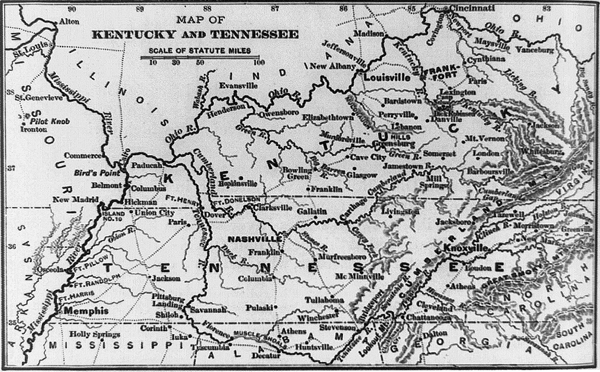
Civil Warera battlefields and fort sites in Kentucky and Tennessee. Courtesy of the Library of Congress, LC-USZ62-93300.
Introduction
Larry H. Whiteaker
Kentucky and Tennessee. Tennessee and Kentucky. Sister states. Enemy states. From the 1770s, when settlers from Virginia and North Carolina began to move into the lush valleys of East Tennessee and central Kentucky, these two states would be linkedwhether the residents wished this or notin the national consciousness. Even with many similaritiesterrain, climate, settlers background, and religion, to name a fewthere would always be major differences. By the 1820s, for example, a huge political rift would develop, pitting the followers of Kentuckys Henry Clay against the followers of Tennessees Andrew Jackson. The ultimate difference would come in 1861a difference that constitutes a major theme of this essay collectionwhen Tennessee joined the Confederate States of America and, after a failed attempt to remain neutral in the Civil War, Kentucky remained in the Union.

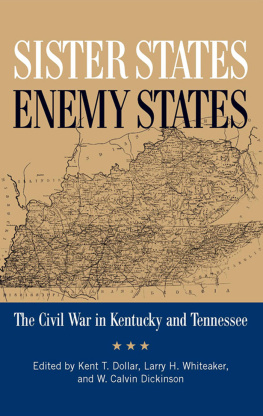
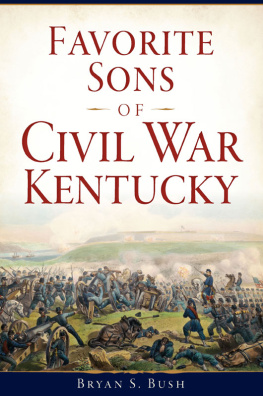
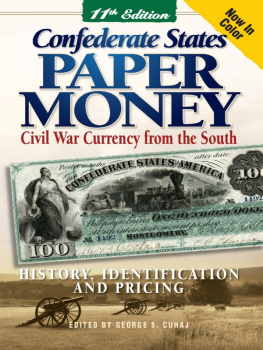

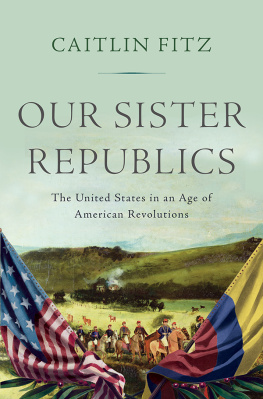
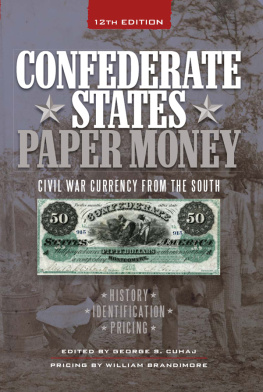
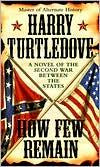
![Fawcett - How to lose the Civil War : [military mistakes of the War between the States]](/uploads/posts/book/92687/thumbs/fawcett-how-to-lose-the-civil-war-military.jpg)
